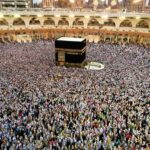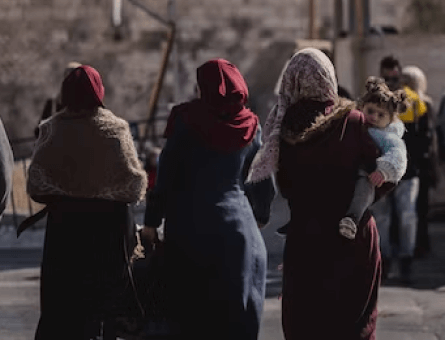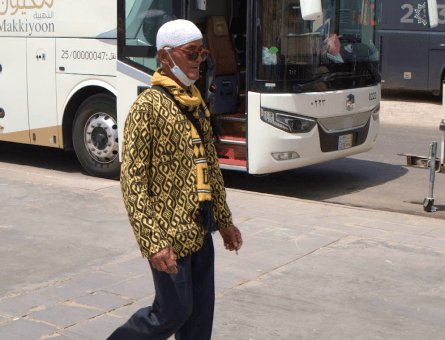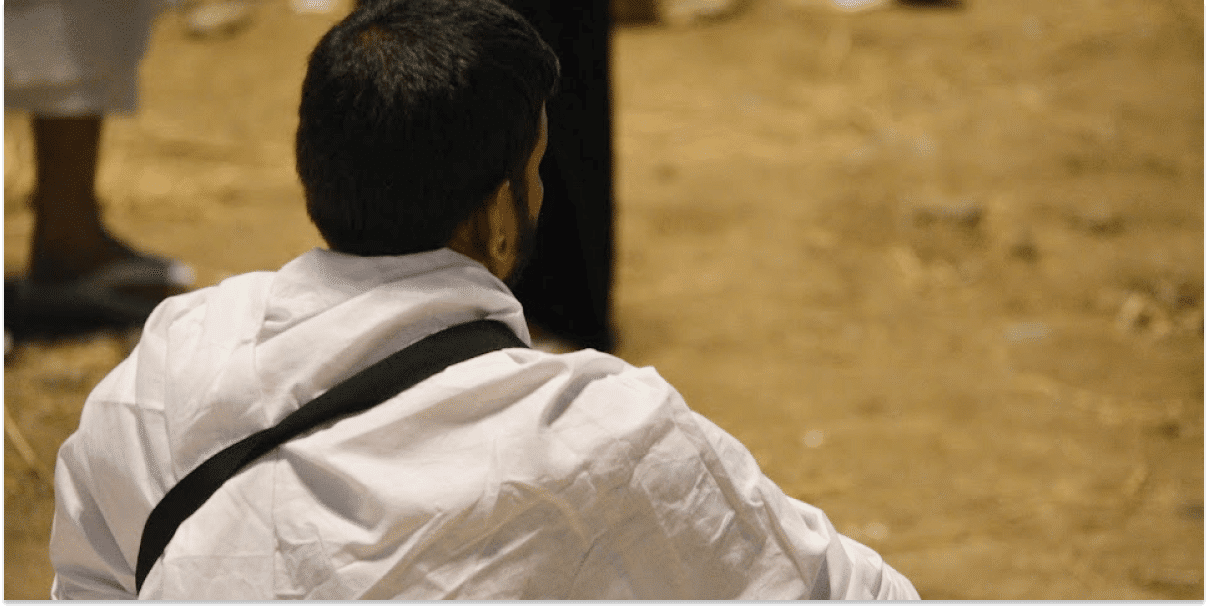Talbiyah – What Does It Mean?
In Islam, as soon as one enters the state of Ihram, one should recite the Talbiyah. It is a devotional prayer recited by Muslim pilgrims with the belief that they intend (niyah) to perform Hajj or Umrah only for the glory of Allah (SWT). Talbiyah is recited at least a hundred times throughout the pilgrimage.
If you have ever gone to perform Hajj or Umrah, you might understand the importance of the divine dimensions of Talbiyah and its ability to strengthen your connection with Allah (SWT). The Talbiyah can be divided into six parts, of which each has its own beautiful and calming meaning. Read on to learn more about Talbiyah and its significance in Islam.
How to Recite the Talbiyah Prayer
Jaabir ibn Adb-Allah (RA), when asked about the Hajj of Prophet Muhammad (PBUH) said, “Then he started to say the words of Tauheed, ‘“Labbayka Allahumma Labbayk, labbayka laa shareeka laka labbayk. Inna al-hamd wa’l-ni’mata laka wa’l-mulk, laa shareeka lak.’” (Sahih Muslim)
Since then, it has become an obligation for Muslim pilgrims to start their Hajj with the words of Tauheed and to continue reciting the Talbiyah along with the words of Tauheed. Therefore, immediately after you wear Ihram and make intention (Niyyah), it’s recommended to utter the words of Talbiyah three times and as frequently as possible throughout the Hajj.
In order to create ease for Muslims while reciting the Talbiyah, it is considered a Sunnah – the way Prophet Muhammad (PBUH) used to recite – to take four brief pauses at the four places marked by dashes below:
بَّيْكَ اللهُمَّ لَبَّيْكَ – لَبَّيْكَ لَا شَرِيْكَ لَكَ لَبَّيْكَ – إِنَّ الْحَمْدَ وَالنِّعْمَةَ لَكَ وَالْمُلْكَ – لَا شَرِيْكَ لَكَ –
Labbayka llāhumma labbayk(a), labbayka lā sharīka laka labbayk(a), inna l-ḥamda wa n-ni’mata, laka wa l-mulk(a), lā sharīka lak.
Soon after reciting the verses of Talbiyah for the first time, it is advised by renowned Muslim scholars to send Salawat (recite Doorud Shareef or Doorud-e-Ibrahim) upon Prophet Muhammad (PBUH) and make supplication (dua) for yourself and others. Moreover, when reciting the Talbiyah, women are directed to recite the Talbiyah softly or in a subdued voice. At the same time, men should raise their voices and chant together the verses of Talbiyah. If you don’t remember the exact words of Talbiyah, you can also say the translation in English or any other language. However, it is recommended to recite the Arabic verses of Talbiyah as much as possible while performing Hajj or Umrah.
English Translation
As stated earlier, Talbiyah can be divided into six parts as follow:
- Labbayka Allahumma labbayk (Here I am, O Allah! Here I am)
The term “Labbayk” here means “I am persisting in obey You, O Allah! I will stick to Your obedience and submission.” The repetition of “Here I am” is to keep the call to Allah (SWT) active and lasting. This response was given by Prophet Ibrahim (AS) to call onto Allah (SWT), as said in the Quran:
“And proclaim the pilgrimage among men: they will come to thee on foot and (mounted) on every kind of camel, lean on account of journeys through deep and distant mountain highways.” [Al-Hajj 22:27]
In short, the purpose of reciting the aforementioned verse altogether is to express your respect and affection for Allah (SWT).
- Labbayka la shareeka laka labbayk (Here I am, You have no partner, here I am)
Shirk- associating partners with Allah (SWT) is the biggest sin in Islam. Therefore, this part of the Talbiyah portrays your willingness to please Allah (SWT) and to abstain from the act of Shirk. In simpler words, while reciting the verse, you call out to Allah (SWT) and tell Him that He is the one and only creator of the worlds and you have no intention to please anyone except Allah (SWT) as He has no partner, nor a son nor a father.
- Innal-hamda (Verily, all praise and thanks belong to You)
The word “Hamd” means to thank and praise. Therefore, the list can be endless with regard to showing gratitude, thanking Allah (SWT) and praising Him for all the blessings. Allah (SWT) has ninety-nine names in His praise, and so you can call out the ninety-nine names when you praise the Al-Mighty.
For example, while supplication (Dua), you can say, O Allah! You are Ar-Raheem- the best in showing continuous mercy. You are Ar-Rehman- the most merciful, and You are Al-Khaliq- the best creator.
- Wan-ni`mata (Verily, all blessings belong to You)
The purpose of this specific part of Talbiyah is to thank Allah (SWT) for all the amazing opportunities and blessings that He has showered upon you. You should start by thanking Allah (SWT) for gifting you the sacred chance to perform Umrah or Hajj despite all your deficiencies and sins. Furthermore, you should thank Allah (SWT) for everything in your life. For example, keeping you healthy, keeping all your senses active and working, helping you with your life plan, and most importantly, making you a Muslim.
After every prayer (Salah), you should recite Alhamdulillah thirty-three times and then thank and praise Allah (SWT) for all the blessings of your life.
- Laka wal-Mulk (Verily, all sovereignty belongs to You)
The aforementioned part of Talbiyah refers to the fact that everything in this world only belongs to Allah (SWT). All belong to Allah (SWT) alone, from the sovereignty to the dominion to power to the kingdom, all belong to Allah (SWT) alone as He is eternal and absolute. This includes the richness and powers of the earth, the country you live in, the air you breathe, the sun, moon, stars, rain, light, and dark; in short, everyone and everything from humans to animals to jinns to angels belongs to Allah (SWT).
- La shareeka lak (You have no partner)
The last part of Talbiyah tells us that Allah (SWT) is alone and has no partner in sovereignty, praise, and thankfulness. Hence, we should only Love Allah (SWT) and pray to Him. You can pray by saying something similar to, “Everything that You have in Your life is because of Allah (SWT); You will always be His slave and will never be scared of anyone other than Him or Love anyone more than Him.”
When to Recite the Prayer – During Hajj or Umrah?
Soon after wearing the Ihram, you should start reciting Talbiyah as much as possible while performing Umrah and Hajj. According to the Sunnah, pilgrims should read Talbiyah in all conditions, whether they stand, sit, walk, rest, travel, and even during the state of minor or major impurity.
Moreover, while performing Hajj or Umrah, Talbiyah should also be recited during changing conditions – places and times. This means that you should read Talbiyah at all times – when boarding, when entering Miqad, coming of the day or night, when you meet a group of pilgrims and after Salah.
Hajj pilgrims should keep reciting Talbiyah until they perform the stoning of Jamarah al-Aqaba on the 10th of Dhul Hijjah. However, Talbiyah should not be recited during Sa’ee or Tawaf. Umrah pilgrims should stop chanting Talbiyah before the beginning of Tawaf.
Talbiyah Hadith
Sahl bin Sa’d narrated that Prophet Muhammad (PBUH) said: “There is no Muslim who recites the Talbiyah, but whatever is to his right and his left of stones, rocks and clods recites it with him, to the furthest point to the east and the west” – meaning from his right and his left.” (At-Tirmidhi, 828)
In another place, while stating the significance of Talbiyah in a Muslim’s life and Islam, Prophet Muhammad (PBUH) said: “When any pilgrim utters Talbiyah, every stone and tree on his right and his left responds with a (similar) Talbiyah, until the whole earth resounds with it.” [Ibn Khuzaymah]
Benefits of Reciting Talbiyah
To all those who might feel shy while chanting Talbiyah loudly, they should know that Satan (Shaitan) whispers to them and tells them to avoid reciting Talbiyah out loud. Therefore, if you ever have any doubts about reciting Talbiyah loudly, remember that it is Allah (SWT) who privileged you with the reward and honour of visiting the Holy Ka’bah, in Makkah, Saudi Arabia. Also, if you say Talibyah softly, there’s a chance that you might miss witnessing the connection with nature – clouds, stones, trees, and rocks – as they might not be able to hear you. However, women are obligated to recite Talbiyah in a soft voice.
The act of reciting Talbiyah can be referred to as a slogan for Muslims for declaring their identity. It makes a person feel special and proud of being born a Muslim. Talbiyah is a symbol of distinction as it differentiates Muslim Ummah from the people of other religions. It tells us that the earthly life is temporary, and we are all servants of Allah (SWT), so we should praise and thank Him for all the blessings of this life.
Jabir ibn Abdullah states that the Prophet Muhammad (PBUH) once said:
“There is no Muhrim who exposes himself to the sun all day for the sake of Allah, reciting the Talbiyah until the sun goes down, but his sins will disappear, and he will be as he was on the day his mother bore him.” (Ibn Majah Vol. 4, Book 25, Hadith 2925)
What Is Tawaf in Islam?
The act of Tawaf in Islam means to walk in circles or circumambulate around the Holy Kaaba in an anti-clockwise motion. While performing Hajj or Umrah, Muslim pilgrims are obligated to perform Tawaf seven times around the Holy Kaaba – it should start from Hajar al-Aswad and end at the same spot. The main purpose of Tawaf is to bring Muslims closer to Allah (SWT).
Summary – Talbiyah
Talbiyah is a chant or slogan that Muslims recite while performing Hajj or Umrah. It is recited from the moment Muslims wear Ihram to the final ritual of Hajj or Umrah. Talbiyah teaches a soul the significance of being sincere with Allah (SWT).
Explore The New Pilgrim App
The Ultimate App
for Hajj and Umrah!













